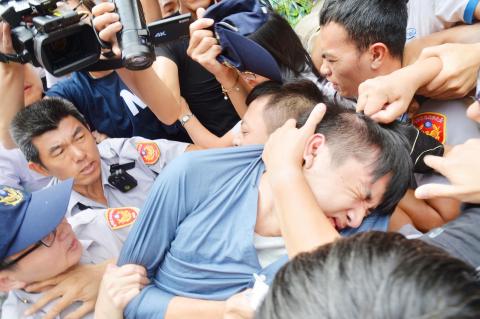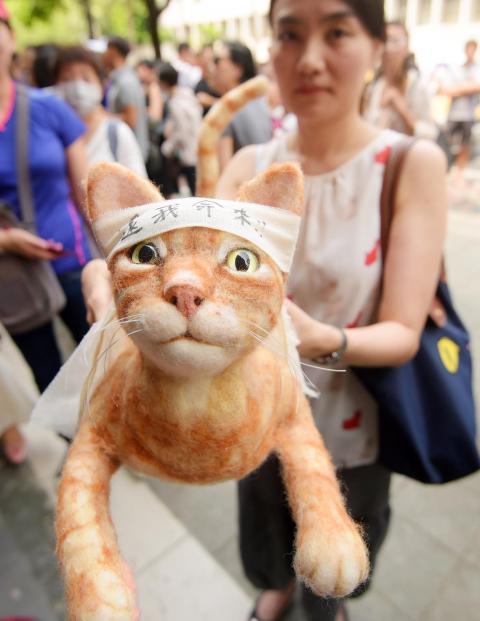There were chaotic scenes outside the Taipei District Court yesterday as the trial of suspected cat killer Chan Ho-yeung (陳皓揚) opened, with angry protesters scuffling with police and some breaking through a cordon to attack Chan as he left the building.
More than 100 animal rights activists gathered in front of the court to protest against the killing of popular stray cat “Big Orange” in December last year, shouting that Chan was “human trash” and “a low life” and demanding that the court sentence him to the heaviest penalty stipulated by the Animal Protection Act (動物保護法).
Chan has also been accused of beating to death a cat known as “Ban Ban” (班班), that had been kept as a pet by a vegetarian restaurant and went missing on Aug. 2.

Photo: CNA
The 22-year-old National Taiwan University (NTU) graduate student from Macau represented himself without a lawyer at the proceeding, where he was charged with violating the Animal Protection Act over Big Orange’s death.
Chan admitted guilt, telling judges: “I have a psychological problem, and I could not control the compulsion to kill a cat. So when I saw Big Orange as I was passing by, I could not restrain myself from committing the crime.”
Prosecutors said NTU had provided Chan with psychological counseling, but he still allegedly killed a second cat, which shows that he has deeply ingrained antisocial tendencies and lacks compassion for animal life.

Photo: Huang Yao-cheng, Taipei Times
Therefore, counseling is insufficient, and Chan should be ordered to undergo psychiatric treatment at NTU Hospital, to stop him from torturing and killing any more cats, prosecutors said.
The judges released Chan on NT$200,000 bail. His next court appearance is scheduled for Sept. 22.
Trees Party Secretary-General Lee Chien-ming (李建明) said that the courts usually treat animal abusers leniently.
Chan is a repeat offender, as he allegedly killed another cat in Taipei on Aug. 2, and he should be punished proportionately and ordered to undergo therapy, Lee said.
Animal rights advocates called on the legislature to immediately approve draft amendments of the Animal Protection Act, which would double the penalties for animal cruelty from a maximum one-year prison sentence and a fine of between NT$100,000 and NT$1 million (US$3,197 and US$31,969) to a maximum two-year prison sentence and a fine of between NT$200,000 and NT$2 million.
Democratic Progressive Party Legislator Huang Wei-cher (黃偉哲) said animal cruelty is an early predictor of later violent crimes against people, and increased penalties for animal abuse are necessary to prevent more serious crimes.
Animal rights advocates from Macau said they suspect Chan was behind the deaths of three stray cats in Macau during the Lunar New Year holidays, and they were concerned that Chan would harm more animals if he was released and deported to the territory.
Chan was escorted through a furious crowd to a car supplied by NTU, with protesters throwing objects and trying to obstruct the car.
Before he got into the car, protesters scuffled with police trying to protect Chan, who was punched, gouged, and put in a headlock by members of the crowd.
Several court bailiffs and journalists were knocked down by the surging crowd, with some sustaining minor bruises.
Two police officials also received minor injuries during the commotion.

An essay competition jointly organized by a local writing society and a publisher affiliated with the Chinese Communist Party (CCP) might have contravened the Act Governing Relations Between the People of the Taiwan Area and the Mainland Area (臺灣地區與大陸地區人民關係條例), the Mainland Affairs Council (MAC) said on Thursday. “In this case, the partner organization is clearly an agency under the CCP’s Fujian Provincial Committee,” MAC Deputy Minister and spokesperson Liang Wen-chieh (梁文傑) said at a news briefing in Taipei. “It also involves bringing Taiwanese students to China with all-expenses-paid arrangements to attend award ceremonies and camps,” Liang said. Those two “characteristics” are typically sufficient

A magnitude 5.9 earthquake that struck about 33km off the coast of Hualien City was the "main shock" in a series of quakes in the area, with aftershocks expected over the next three days, the Central Weather Administration (CWA) said yesterday. Prior to the magnitude 5.9 quake shaking most of Taiwan at 6:53pm yesterday, six other earthquakes stronger than a magnitude of 4, starting with a magnitude 5.5 quake at 6:09pm, occurred in the area. CWA Seismological Center Director Wu Chien-fu (吳健富) confirmed that the quakes were all part of the same series and that the magnitude 5.5 temblor was

The brilliant blue waters, thick foliage and bucolic atmosphere on this seemingly idyllic archipelago deep in the Pacific Ocean belie the key role it now plays in a titanic geopolitical struggle. Palau is again on the front line as China, and the US and its allies prepare their forces in an intensifying contest for control over the Asia-Pacific region. The democratic nation of just 17,000 people hosts US-controlled airstrips and soon-to-be-completed radar installations that the US military describes as “critical” to monitoring vast swathes of water and airspace. It is also a key piece of the second island chain, a string of

The Central Weather Administration has issued a heat alert for southeastern Taiwan, warning of temperatures as high as 36°C today, while alerting some coastal areas of strong winds later in the day. Kaohsiung’s Neimen District (內門) and Pingtung County’s Neipu Township (內埔) are under an orange heat alert, which warns of temperatures as high as 36°C for three consecutive days, the CWA said, citing southwest winds. The heat would also extend to Tainan’s Nansi (楠西) and Yujing (玉井) districts, as well as Pingtung’s Gaoshu (高樹), Yanpu (鹽埔) and Majia (瑪家) townships, it said, forecasting highs of up to 36°C in those areas